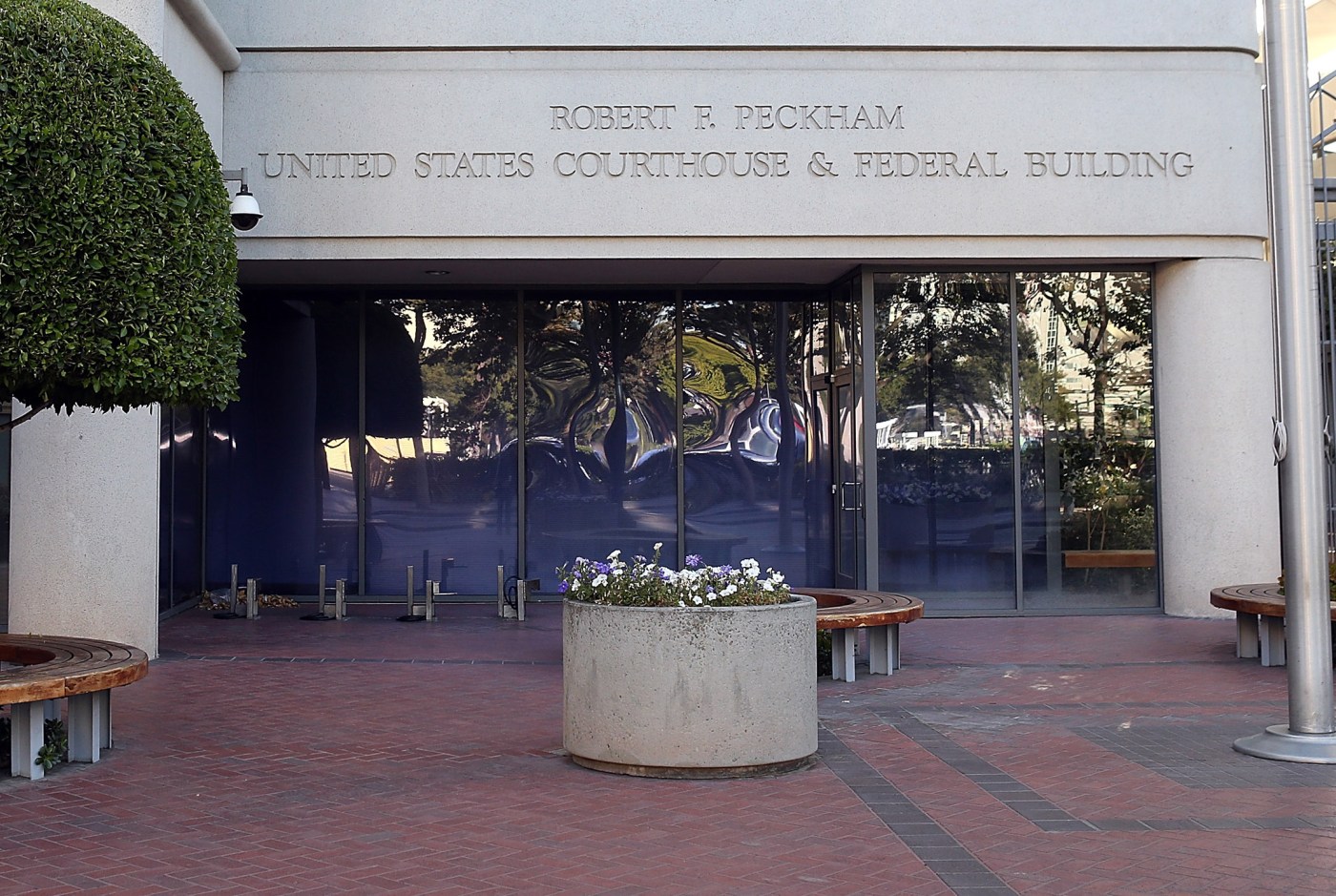SAN JOSE — The former executive director of the San Jose Police Officers’ Association has signaled her intent to admit guilt in a scandal in which she is accused of illegally trafficking opioids by using the union’s headquarters and computers to carry out the scheme under the noses of her law enforcement constituents.
Joanne Segovia, who had been a civilian administrator for the police union for two decades before she was fired after the criminal accusations surfaced last year, appeared before federal Judge Nathanael Cousins on Thursday where she was arraigned on a charge of unlawfully importing a controlled substance.
Earlier this week, prosecutors submitted a new reduced charge sheet to Cousins. The new filing dropped a conspiracy charge that was in the original criminal complaint filed last year, and also changed the involved narcotic from fentanyl to Tapentadol, another powerful and highly addictive opioid painkiller.
Assistant U.S. Attorney Joseph Tartakovsky told Cousins in court that subsequent testing conducted in the past year disproved what federal agents believed was fentanyl contained in a 2023 shipment meant for Segovia, and that there was “no fentanyl present in the package seized.”
Adam Gasner, Segovia’s attorney, said the removal of fentanyl from the scope of the case was important because of the connotation fentanyl carries in the public discourse.
“We’re happy that the truth has finally been revealed. This case was never a fentanyl case,” Gasner said.
Gasner credited the U.S. Attorney’s Office for pursuing an accurate finding even after they initially charged Segovia, and said it should spur more mindfulness about the fallibility of forensic testing.
In court, Segovia entered a not-guilty plea to the new charge, but Gasner told Cousins that he expects a change of plea to be entered at his client’s next hearing scheduled for Oct. 8.
After the hearing, Gasner said Segovia “is going to take responsibility for her actions,” and that she was importing the pills primarily to feed her own opiate addiction. He asserted that any movement of the drugs after she got them was not a planned act but a result of her being exploited by other unnamed actors.
Segovia was “in the throes of addiction, and she herself was taken advantage of,” Gasner said. “Ms. Segovia looks forward to admitting her culpability and accepting the consequences.”
It is not clear what effect the modified criminal complaint could have on potential penalties Segovia faces; the original charges carried a potential punishment of up to 20 years in prison, as do the new allegations.
The modified charges center on the most substantive quantity of drugs that agents from Homeland Security Investigations directly confiscated on March 24, 2023, four days before Segovia was charged. According to an affidavit by Special Agent David Vargas, 73 Tapentadol pills were found at Segovia’s home and 283 Tapentadol pills were recovered at the police union’s San Jose office.
Eleven days earlier, investigators claimed that a shipment from China of the synthetic opioid valeryl fentanyl — the drug listed in the original charges — was intercepted in Kentucky, with the package labeled “CLOCK” and addressed to Segovia’s home. Agents reported that about 4 grams valeryl fentanyl and oxycodone were found amid a disassembled clock in the form of adhesive patches, a conclusion that the U.S. Attorney’s Office has since disavowed.
Segovia, who has been out of custody as the federal case progressed, was arrested as part of an ongoing HSI probe into a network that was shipping controlled substances to the Bay Area from abroad. At least 61 packages were delivered to Segovia’s home in San Jose between October 2015 and January 2023, according to the affidavit authored by Vargas. Manifests for the packages indicated senders from countries including India, China and Canada, and listed the contents as wedding party favors, clothes, makeup, candy and health supplements.
Vargas wrote that authorities opened five of the packages between July 2019 and January 2023 and discovered thousands of dollars’ worth of controlled substances, including the synthetic opioids Tramadol and Tapentadol.
Related Articles
He allegedly crashed his car in Richmond while drunk, killing a passenger, then picked up another DUI charge
Authorities identify pregnant woman strangled; live-in boyfriend charged with murder
‘You can look at me, baby. I forgive you’: An East Bay man was wanted for murder, but the victim’s brother found him before the police
Teen, adult charged in dispute over sale of marijuana vape pens that left East Bay mother of eight dead
Oakland withdraws $461 reimbursement request for overpayment to slain OPD officer Tuan Le
Segovia is accused of using her work computer and the union office to order and distribute the drugs. In at least one instance, investigators say she used the union’s UPS account to send an illicit package to a supplier in North Carolina.
Agents also examined Segovia’s WhatsApp account and reported finding communications implicating her, including hundreds of messages exchanged with a phone number registered in India between January 2020 and March 2023; those messages discussed shipping and payment details as well as photos of tablets, shipping labels, packaging, receipts and payment confirmations.
According to the HSI investigation, agents interviewed Segovia in February and March 2023. After first being informed that her name was on the shipments of the disguised narcotics, she pleaded ignorance and reportedly told them she had only ordered supplements and claimed to “work for the police department,” which would have been an exaggeration. In a second interview, she reportedly blamed the shipments on an unnamed woman who she said worked as her housekeeper, saying the woman had been impersonating her on WhatsApp and that “it all leads to her.”
Investigators would later learn that Segovia had received two letters from U.S. Customs and Border Protection in 2019 and 2020 stating shipments intended for her had been seized, with one shipment containing 1,160 grams of Tramadol, and the other 1,418 grams of Tramadol. She reportedly gave the agency a signed response stating she did not want to claim the shipments.












